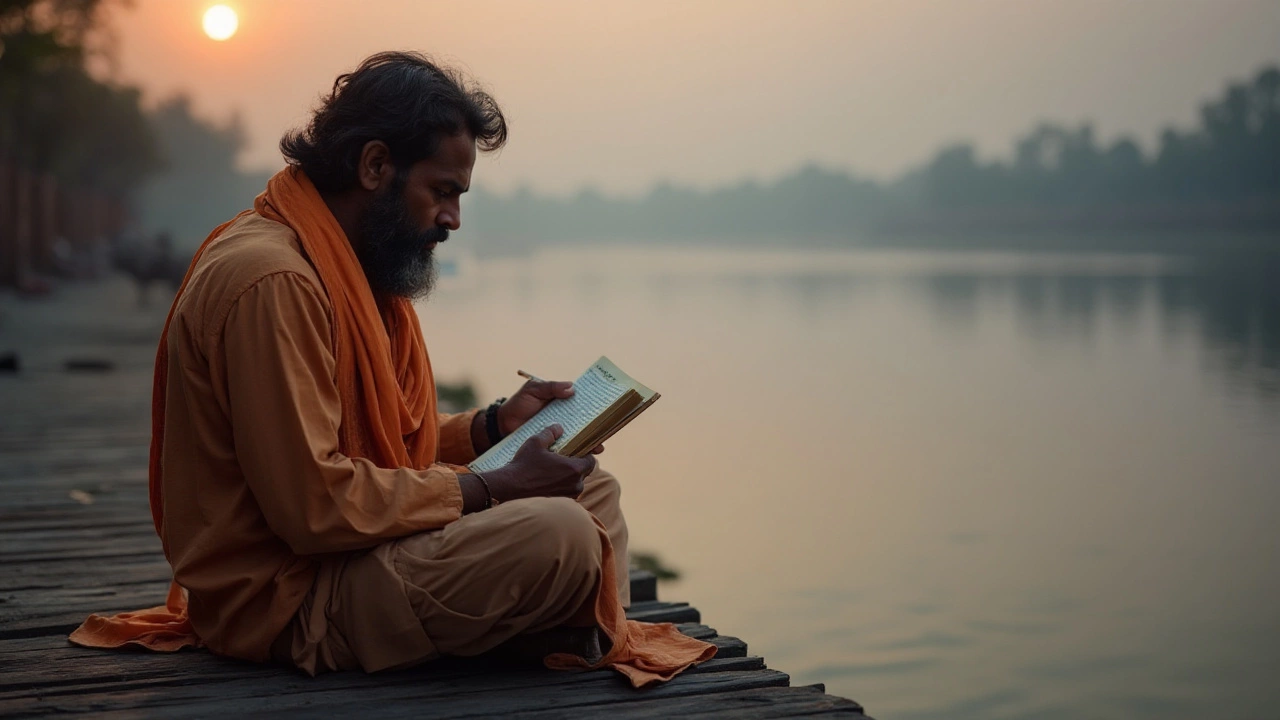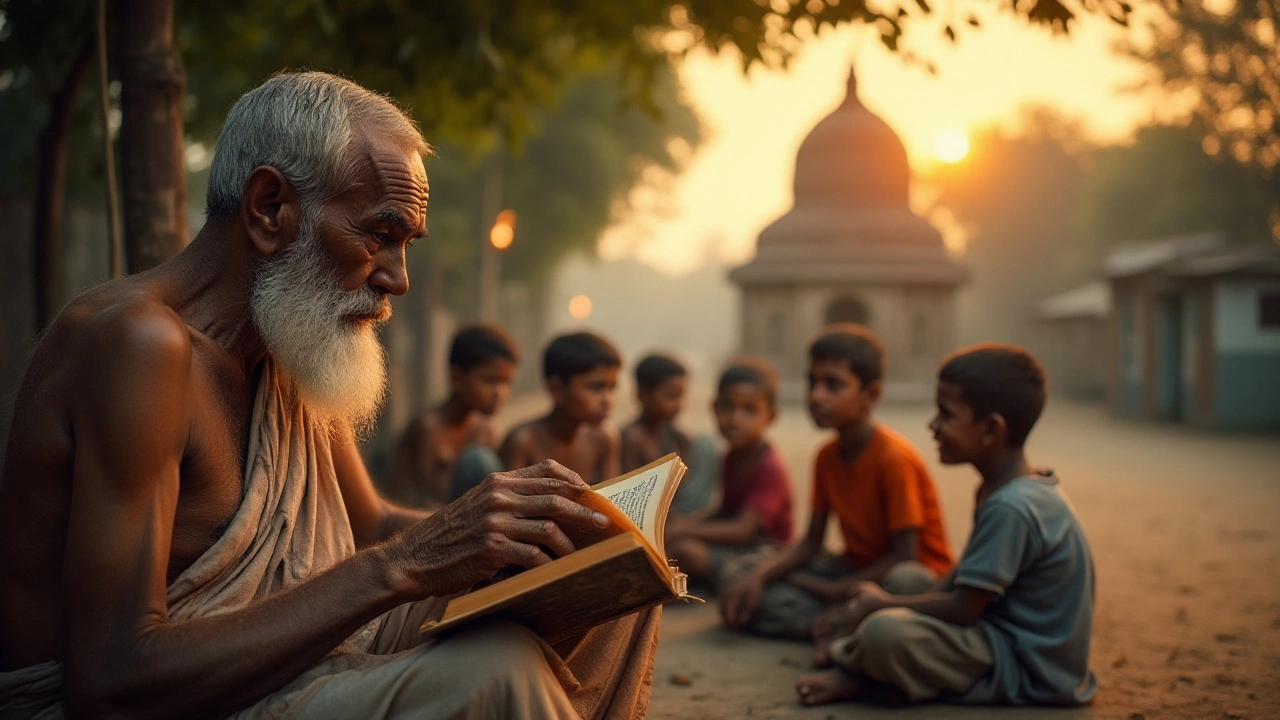Heartbreaking Quotes from Indian Sad Poetry: A Journey of Emotion
 Jan, 23 2025
Jan, 23 2025
Sad poetry is an artistic expression of sorrow and longing that captures the depths of human emotion. In India, this genre has its roots deeply embedded in culture and literature, offering poignant reflections on the complexities of life and love. Heartbreaking quotes from these poems often speak to universal truths about pain and loss, touching the hearts of readers across generations.
The emotional turmoil depicted in such quotes helps individuals find solace and understanding in shared experiences of heartache. By examining famous works and iconic lines, we gain insight into the powerful effect of sorrowful verse and why it continues to move us. With an appreciation for its beauty, you might also be inspired to channel your own emotions into poetic form.
- The Essence of Sad Poetry in India
- Why Heartbreaking Quotes Resonate
- Famous Indian Sad Poets and Their Work
- Analyzing Iconic Heartbreaking Quotes
- The Emotional Impact of Poetry
- Tips for Writing Sad Poetry
The Essence of Sad Poetry in India
Sad poetry in India elegantly captures the multifaceted nature of human sorrow, weaving intricate narratives of pain and resilience. At its core, this form of poetry is not just a lamentation but a profound exploration of the mind's darkest corners. Throughout history, poets have used verses to express sentiments that transcend the ephemeral, creating a tapestry of expressions that speak to the soul. Embracing themes of heartbreaking quotes and emotional outreach, these poems often evoke a sense of universal connection. It’s in verses from classic works such as Mirza Ghalib's ghazals where one finds the true essence of melancholy intertwined with wisdom, offering solace to the broken-hearted. The tradition of writing sad poetry in India is also deeply rooted in musical compositions, which adds a haunting melody to its narrative, amplifying the emotional impact.
Indian sad poetry often relies on vivid imagery and profound metaphors to articulate complex emotions. This vivid portrayal of feelings such as unrequited love or existential despair is what makes the poetry so enduring. Consider the legendary poet Faiz Ahmed Faiz, whose work consistently lays bare the poignant realities of life. In his lines, "Aur bhi dukh hain zamāne mein mohabbat ke siwā, Rāhatein aur bhi hain vasl kī rāhat ke siwā," we are reminded that there are other pains in life besides those of love, and joys beyond the relief union provides. By addressing a spectrum of emotions, Indian poets create heart-wrenching verses that resonate with diverse audiences. Each piece, through its structure and choice of words, invites the reader on a journey of introspective discovery and healing.
The timeless quality of sad poetry owes much to its adaptability. Despite changing societal norms and values, the core emotions embedded within these poems remain relevant. This adaptability is part of what helps the poetry endure years and speak to younger generations today. As one delves into these poetic works, there appears a wealth of wisdom drawn from both contemporary and bygone eras. The struggle and solace found in sad poetry foster a connective experience between poet and reader, emphasizing shared human experiences. Through its evocative power, the poetry becomes a mirror reflecting our innermost fears, regrets, and hopes. This notion explains why many emotional poetry enthusiasts often return to these quotes for guidance and peace.
Why Heartbreaking Quotes Resonate
Heartbreaking quotes from sad poetry have an uncanny ability to pierce through the veil of everyday life and touch the core of human emotion. They encapsulate experiences of heartache and sorrow in ways that mere anecdotes or narratives fail to do. These fragments of pain-stricken eloquence speak a universal language, addressing emotions we often struggle to articulate in our own words. When a line of poetry captures the indescribable anguish of a broken heart or a shattered dream, its resonance is profound and personal. Readers find themselves reflected in the imagery and sentiments, forming an intimate connection with the words that feel as though they express their own secret suffering. This shared vulnerability is what draws us to them; they articulate our internal struggles, offering not solace but an acknowledgment of our grief.
Historically, poetry has been a means of chronicling human experiences, especially those that involve emotional turmoil. Across various cultures, poetry served as a way to voice what was otherwise left unsaid, its unflinching honesty offering a cathartic release for both creator and observer. In India, a rich tradition of emotional poetry exists, where literary giants have explored the contours of love and loss with unparalleled depth. Renowned poets like Mirza Ghalib and Rabindranath Tagore have penned verses that echo the complexities of relationships and the passage of time. This is not merely about wallowing in sadness; rather, it is about recognizing emotions as part of the human experience, allowing readers to confront feelings they might otherwise suppress.
Emotionally powerful quotes reach beyond individual experiences, tapping into collective emotions. They often provide a contextual map for grief, love, and longing, traversing the highs and lows of the human condition. The reason we might memorize or even quote such lines is not just because they're beautifully composed; it’s because they capture something deep about our humanity.
"The wound is the place where the Light enters you," wrote Rumi, emphasizing that through our deepest sorrows, we often find a path to healing and understanding. His words remind us that shared pain can lead to shared healing, a testament to the communal nature of our emotional lives.Another aspect of why such poetry holds its ground is the cultural setting it often references, which may be broadly relatable or specifically tailored to societal conditions. This backdrop gives a multidimensional texture to the words, making them resonate within specific contexts and beyond.
It’s fruitful to consider how heartbreaking quotes can offer emotional lessons. For instance, they often teach empathy and understanding, prompting us to think beyond our immediate experiences. Readers might find themselves reflecting on past decisions or consider new perspectives on love and life. This transformative power makes poetry not just an art form but also a guide through the labyrinthine paths of our emotions. Indian quotes in particular, with their unique blend of sincerity and introspection, have long captivated readers around the globe.
Moreover, creation of sad poetry and the poignant quotes it contains, is an act of resilience. It weaves a tapestry of endurance, showing the beauty in human fragility. Knowing that our deepest struggles have been shared and expressed by others can mitigate the isolation we often feel. To write or engage with sad poetry is to sit with one's emotions without judgment, recognizing the worth and the lessons hidden within the pain. Hence, these quotes are more than just art; they are conversations with our inner selves, challenging us to grow and transform through them.

Famous Indian Sad Poets and Their Work
Indian literature is rich with poets who have captured the melancholic side of life through their verses. Their poignant expressions delve into the sad poetry genre, revealing the emotional intricacies of the human condition. One such celebrated poet is Mirza Ghalib, whose ghazals are revered for their emotional depth. Ghalib's work, like 'Dil-e-Nadaan Tujhe Hua Kya Hai?', resonates with those who've experienced the tumult of unfulfilled desires. His mastery of language allows readers to feel the agony he felt, even across the centuries.
Another luminary in this realm is Faiz Ahmed Faiz, a poet whose words weave through the pains of love and separation. His famous line, "Aur Bhi Dukh Hain Zamane Mein Mohabbat Ke Siwa," emphasizes that beyond love, the world is filled with countless other sorrows. Faiz's poetry often illuminates personal suffering while also reflecting broader themes of social injustice and political turmoil, balancing personal grief with universal concerns.
Rabindranath Tagore, though widely celebrated for his uplifting and spiritually enriching compositions, has also contributed significantly to the landscape of Indian sad poetry. His works such as 'Shesh Kothaay', capture the fragility of life and the inevitable parting from loved ones. Tagore eloquently expresses the delicate interplay of joy and sorrow, inviting readers to reflect on the transient nature of happiness.
The poetic journey isn't complete without mentioning Amrita Pritam, whose poignant writing explores the nuanced dimensions of human pain and tenderness. One of her most cherished poems, 'Ajj Aakhaan Waris Shah Nu,' expresses the collective trauma of the Partition, while intertwining personal anguish. Pritam's voice stands out for its feminine delicacy intertwined with resilience, immortalizing her as a beacon of heartbreaking quotes and emotional storytelling.
These poets, and others like Sahir Ludhianvi and Ahmad Faraz, have intricately woven the themes of sorrow and longing through their illustrious careers. Their works often serve as a cathartic experience for readers, allowing them to explore their own feelings of heartache through the safety of verses. As we read their poems, we don't just engage with words; we navigate the rich tapestry of human emotion, drawing comfort from the shared experience articulated so artfully in their lines.
Analyzing Iconic Heartbreaking Quotes
The art of distilling heartache into a few poignant lines is not an easy feat. Yet, Indian sad poetry has produced some of the most emotionally resonant and devastating quotes over the years. These quotes reflect a deep understanding of the human condition, an insight into the vulnerabilities and sorrows that define life itself. For instance, the works of the legendary poet Mirza Ghalib are replete with lines that echo the sorrow and longing many of us have felt in moments of loss. His ability to express such profound emotion in just a few words is a testament to his mastery of the craft.
Analyzing these quotes provides a window into the minds of the poets and the era they lived in. A common theme is the motif of unrequited love, often seen as an unmatched source of deep sorrow. This theme is not only prevalent in Ghalib's poetry but also in the works of other iconic poets such as Faiz Ahmed Faiz and Sahir Ludhianvi. These poets, through their eloquent and often heartbreakingly beautiful quotes, articulate the pain of expectations that remain unmet, and the despair of love that is never realized. Such quotes continue to resonate, allowing readers to find solace in the fact that they are not alone in their emotional struggles.
The structure and choice of words in these heartbreaking quotes are pivotal. Many poets employ metaphors and similes that paint vivid pictures of the emotional landscape. For instance, loss can be likened to the extinguishing of a light or the relentless passage of time. These images provide an immediate understanding of the depth of feeling the poet intends to convey. It is interesting to note how these poets juxtapose beauty with pain, creating a complex tapestry that both aches and enlightens the reader. A well-known line by Faiz, “Aur bhi dukh hain zamane mein mohabbat ke siwa,” reminds us that love is not the only source of disquiet, expanding the scope of sorrow beyond romantic confines.
“The wound is the place where the light enters you.” – Rumi
Such quotes do not merely state emotion; they invoke it, encouraging the reader to reflect on their own experiences. The timeless quality of these quotes suggests that the emotions they encapsulate are as relevant today as they were when first penned. This enduring relevance speaks to the universality of the themes explored in Indian sad poetry. As modern readers, we can draw parallels with contemporary emotions and situations, understanding that while technology and lifestyles may change, human emotions remain remarkably consistent throughout time.
In summary, the analysis of iconic heartbreaking quotes from Indian poetry reveals not only the skill of the poets but also the profound impact their work continues to have on individuals across generations. These quotes are more than just lines of text; they are powerful expressions of the human experience, each word carefully chosen to evoke a specific feeling or thought. Through understanding and appreciating these quotes, we gain a deeper insight into ourselves and the shared nature of human experience, and perhaps an appreciation for the beauty that can be found within sorrow.

The Emotional Impact of Poetry
Poetry has a profound ability to touch the human soul, stirring emotions with each line and stanza. Unlike other art forms, poetry compresses feelings and experiences into a few carefully chosen words, making it both intimate and universal. Indian sad poetry is especially powerful in this regard as it encapsulates the beauty of sorrow and longing through poignant expressions. The emotions conveyed through these poems often resonate on a deeply personal level, enabling readers to find solace and companionship in their moments of distress.
The magic of poetry lies in its capacity to evoke feelings by painting vivid pictures with words. When we read a line about love lost or unfulfilled desires, it transports us to a place where we confront our own joys and sorrows. One remarkable aspect of poetry is that it gives voice to emotions we sometimes fail to articulate, providing clarity and understanding of feelings we didn't even know existed within us. This subconscious connection is part of what makes poetry so impactful, granting us access to a shared human experience that transcends both time and cultural boundaries.
Heartbreaking quotes from Indian poets bring into focus the stark realities of longing and abandonment, echoing sentiments that are both timeless and universal. These poets have a unique ability to frame the ephemeral nature of life and love in tragic beauty, often invoking tears and a sense of nostalgia for what might have been. By engaging with these lines of emotional poetry, we not only explore our vulnerabilities but also discover strength in shared experiences of betrayal and heartbreak.
"Poetry is when an emotion has found its thought and the thought has found words." – Robert Frost
Research has shown that engaging with poetry can have physiological benefits, as well. Studies suggest that reading poems may trigger emotional and cognitive responses similar to those provoked by music, resulting in a therapeutic process that eases stress and promotes emotional healing. By immersing ourselves in the empathetic embrace of poetry, we can achieve catharsis—the process of releasing and finding relief from strong or repressed emotions. Such an emotional journey provides insight into our innermost thoughts and reassures us that we are never truly alone in our struggles.
Ultimately, the emotional impact of poetry is measurable by its ability to elicit profound reactions and create a sense of belonging among individuals who, momentarily, share the same wound of existence. By expressing sorrow and joy, confusion and clarity, poetry shapes the way we perceive and interact with the world around us, guiding us gently through the maze of our intricate inner lives.
Tips for Writing Sad Poetry
Writing sad poetry demands a willingness to delve deeply into personal emotions while maintaining a poetic craft that resonates universally. The essence of sad poetry lies in its ability to convey genuine sorrow and heartache, so the first step is to connect with your own experiences of loss or longing. Reflect on moments that stirred a profound sense of melancholy within you. Ask yourself what these experiences taught you and how they changed you. Exploring personal sorrow allows for an authenticity that readers can recognize and relate to.
An effective way to capture the true essence of emotions is to focus on vivid imagery and sensory details. Instead of merely stating feelings bluntly, paint a picture with words that show the setting, atmosphere, and the emotions swirling around. Relating a broken heart to a barren landscape, or illustrating the heaviness of sadness through thick, suffocating fog can invoke far more powerful reactions than mere declarations of grief.
"Poetry is when an emotion has found its thought and the thought has found words," - Robert Frost.
Heartbreaking quotes often emerge from poems that embrace contrasts and contradictions, reflecting the complexity of our emotions. Consider juxtaposing moments of beauty with tragedy, or hope with despair. This can create rich layers of meaning and raw emotional power. As you weave these elements together, pay attention to the rhythm and flow of the poem, as they can intensify the emotional impact. Employ varied line lengths and appropriate pauses to mirror the cadence of the human heart in times of sadness.
When writing poetry that is both authentic and engaging, language choice becomes crucial. Use metaphors and similes to express feelings uniquely, avoiding clichés that may dilute the impact of your words. Choose your words carefully, opting for those that carry weight and depth. The simplicity in language often heightens emotional resonance, forging a stronger connection with your audience. In doing so, your poetry can transform individual sorrow into a collective experience of empathy.
Revisions are vital. Writing may begin with raw emotion, but shaping and refining your work is where true artistry lies. Read your poem aloud and listen to its cadence. Alter lines that feel awkward, and tighten loose ends. Each word should serve a purpose, guiding the reader through a journey of sadness that is both beautiful and moving. Sharing your poetry with others and receiving feedback is a valuable way to gain insights into its impact and effectiveness.
Lastly, immerse yourself in the works of respected poets from Indian sad poetry. By studying their techniques and influences, you can gain inspiration and understanding of how they craft their moving lines. Take time to analyze their themes, pay attention to how these poets manage to stir emotions with deft strokes of their pen. Experiment with your voice and style; embrace the evolution of your writing. Though sad poetry often emerges from personal pain, it possesses the healing power to transform grief into artistry.